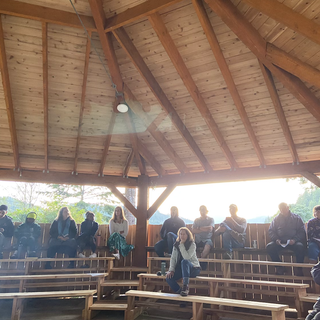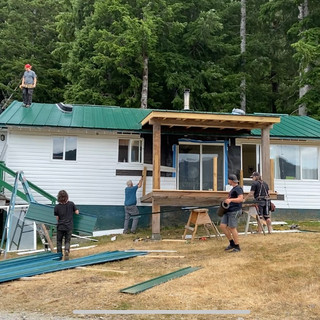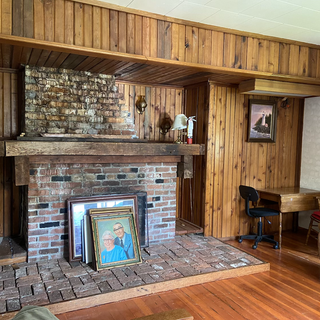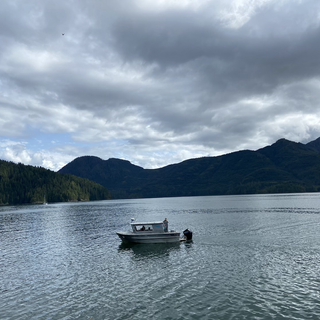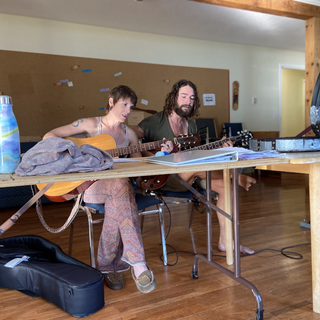
I was blessed to participate in and lead worship for a missions trip with Mosaic Church from Victoria, BC, that took us to the wild west coast of Vancouver Island to a Christian-run outpost nestled in the straights around Nootka Island. It's a humble but fully equipped camp and lodging center which in the more past has hosted kids events, retreats and recovery programs. The facilities need some serious TLC.
Serving with joy: click on images to see the whole picture.
Esperanza is about 7 hours from Victoria. All supplies must be packed in as there is no store at the outpost, nor anywhere nearby. The entire facility is powered by a monster generator that goes off at 11pm and back on at 7 in the morning. Water is to be used sparingly, cell service and wifi unavailable.

We installed a new roof on one of the cabins, tidied the main buildings, and took down a big tree, splitting and stacking somewhere around 8 cords of logs. We prepared hearty meals each day for the teams, gathered for Bible study and worship each evening, roasted marshmallows, got silly, told stories, and relished late-night heart-to-hearts. The sun was strong and we labored hard beneath it, enjoying the healing powers of chilly Pacific plunges at the end of the workday. It was one of those memory-making experiences that leaves you connected to each person present, with an unspoken, "you were there" glance.
Building the roof: click on images to see the whole picture.
FROM SHANTYMEN TO BIBLE CAMP
In the 1930’s a fellow named Percy Wills began work with a Toronto missionary group called the Shantymen, whose area of focus was the west coat of Canada. Wills noticed that there was no medical care for people in this region, including native villages and tradesmen such as fisherman, loggers, lighthouse operators, etc. He got in touch with a doctor, Herman McLean, who was trained for medical missions work, and together they established the Esperanza hospital in 1937. In addition to serving patients at Esperanza, McLean tended patients at two other regional clinics - Tahsis and Zeballos - and did regular outpatient visits to nearby native villages and logging camps.

Over the years there were conflicts that threatened the Esperanza clinic such as gold miner rushes in the area, tension between the protestant Shantymen/Esperanza missions and the Roman Catholic church regarding evangelizing and assisting native communities, and political/racial tension with First Nations tribes. However the clinic continued to work with all peoples in that region until 1973 when it was shut down by the provincial government and McLean retired. This took a toll on staff and financial support of the Esperanza outpost, though they continued to offer faith-based support to the area, even with significantly reduced staff.
A second wave of support came to the clinic when a flourishing dentist practice opened, and shortly after, a school was established. There was a dormitory for far-away children, and some entire families decided to relocate. The school served mostly First Nations and remains in close relations to local bands to this day.

Pulling up to the Esperanza dock.
Hospitality expanded to developing programs for crisis centers and troubled boys. During counter culture movements of the 60's and 70's, many searching young people ended up there and turned to Christ as a result. A gas station and coffee shop were also opened on the dock for boaters.
In the early 1990's, Esperanza officially became operated by the Shantymen's organization (Shantymen Christian Association), establishing a "camp director" there and becoming a hospitality center offering youth camps, hosting families in crisis, and programs for people in recovery.
However, in the early 2000's, the Esperanza community separated from the Shantymen over concerns that centralization of the SCA, mainly operating out of Toronto, didn't directly address local needs. Through donations and the work of privately sponsored volunteers, Esperanza has continued to run camps and hospitality programs to this day, which also earns modest revenue through their boater's gas station.
"TO PREACH CHRIST AND HEAL DISEASES"
The original homes and a cemetery.
The work of Dr. McLean was unique in the sense that while he certainly was a respected doctor, his first love was evangelism. He came out of the United Church of Canada, which has become more universalist over the years with a watered-down emphasis on Christian doctrine. Even in the 1930's, McLean noticed this, and seeing himself as a missionary first and a doctor second, he injected Christ into his medical practice. He was known to pray before surgeries, and encouraged nurses to discuss spiritual matters at their patients' beside. Though he recorded medical reports in his annual review books, he spent more pages recounting patients' conversion stories.
Another unique aspect of the Esperanza practice was that the employees did not receive a salary for their work, but accepted housing and a small food stipend, pooling remaining income into a "common budget" that paid for hospital needs, supported people who acted strictly in the roll of evangelistic outreach, and funded youth oriented vacation Bible camps. Volunteers were drawn to work there, which remains the case today.
Dr. McLean had a "progressive" view of women's leadership, highly valuing his female staff such as nurses and Bible school teachers, and hired women as conference speakers. His daughter, who was raised at Esperanza, noted that when she moved to other regions, she did not realize it wasn't the norm for women to teach and share the gospel as liberally as they did at the outpost.
In a double-edged-sword sort of way, there was an unusually high number of medical staff whom, after working at Esperanza, felt prepared and called to do foreign missions work, leaving Esperanza in continuous flux of departing workers who left for oversees projects. Nonetheless, God seemed to provide Esperanza with a flow of workers and volunteers which kept them afloat.
ESPERANZA & FIRST NATIONS UNITY
The story of how the hospital was eventually forced closed is technical, but the facilities at the outpost flourished as an evangelical outreach center, even during times when culturally such interest and programs were waning and out of fashion. Some attribute this to the fact that Esperanza, in another progressive move, provided an alternative to the damaging Catholic-run residential school programs for First Nations children throughout Canada, offering schooling that differed drastically from the institutionalized indoctrination method. This was noted and respected by the First Nations people, whose own traditional values aligned more with the evangelical methodology of education than the Roman Catholic one.

The respect and bond with First Nations people was further bolstered when Esperanza leadership welcomed and supported the Pentecostal revival movements happening among local bands, which were often disparaged among other evangelical organizations. They also welcomed the First Nations to pray with them instead of the common patronizing "pray for them" approach. Today, the folks of European descent who oversee the outpost maintain the respect of First Nations groups who recognize that, while most white preachers and doctors casually drop in and drop out of their villages, the Esperanza community has remained steadfast, ever-present, and continuously connected for almost a century.

THE POOR BOY'S DREAM: PERSONAL REFLECTIONS
The drive to Esperanza from Victoria was long and lovely, and a bit of an adventure once we hit the unpaved logging road taking us to Zeballos, where we'd be catching a boat to the outpost. As we moved further Northwest, the trees grew bigger, the mountains more majestic, and eventually, the cell service disappeared, and we were surrounded by nothing but the present moment. Those factors stirred my spirit, but the moment our small motorboat kicked into gear, I was legit having a religious experience. It felt not only completely natural for me to be in this environment - as if this were not the first but the five-hundredth time I'd been on those waters - but it was as if I had finally caught up with myself, or that time had at last met me where I was at: a personal singularity moment; a cosmic "YES."

Everything about Esperanza lifestyle reinforced this: the musty cottages and cedar-scented bunk houses, the fire pit and camp kitchen, the old songbooks and vintage pianos filled me with nostalgia and a sense of purpose - of carrying on a lineage that was clearly precious and loved by many predecessors, like a well-worn Nana-made quilt. There was history here that sang its tales like shanty songs in the salty breeze - a breeze that sang my own song too...
One day I was out on the dock helping unpack the supplies for the roof repair, which had just arrived by boat. During a break, I sat at the very end of the dock, dangling my feet over the edge. The cold Pacific inlet waters slapped the barnacle-laden beams about 20 feet below. The wind was strong and I held on to my hat. I watched and listened to the gulls as they surfed the gusts, aware of the human activity behind me as fishermen filled up on gasoline and purchased snacks from the tiny general store, talking about their catch, or hopes-thereof. The woman who mans the station - Henrietta - elbowed me with stories about various regulars. We smiled like good Canadians and snickered to ourselves like weathered ones - the kind of Canadians you'd expect to find in these rugged parts; I told Henrietta she was my spirit animal.

My spirit animal Henrietta.
Suddenly as I caught a face-full of brine, I saw my Dad. It was him pulling up on one of those boats. He tossed me the ropes and I tied him in. He had a little tinny radio playing his favorite album, Pocol Harum's Salty Dog. His bearded face looked like a cross between wharf-rat Jerry Garcia and poet-adventurer Ernest Hemingway. He squint-smiled at me in the sun and I recognized the twinkle of his lake-loving father's eyes in him, reminding me of the fishing jaunts we used to take on Grandpa's boat in Lake Michigan.

Young Dale Alan Dieleman telling a legit big fish story.
"Heyyyy Lizzie!" Dad calls to me as he saunters up the ramp with sea legs, embracing me with a bear hug. I smell fish and gasoline on him. I ask where he's coming from and he tells me about some First Nations folk he had just met with - sharing with them stories of the Lakota people with whom he had done missions work and recorded an album. I imagined him then going into the store, bantering with Henrietta. They would have been friends. His own song, "Poor Boy," played in my mind:
I am just a poor boy
I live down by the sea
I don't have much to offer you
But my company...
The line in there somewhere about his friend being a hermit crab gets me every time.

Dad in his watery element.
I smiled and teared up a little and then it hit me: I was literally in my Dad's dream. Time and life had not just caught up with me, but it was as if my father's time and life had just caught up with me as well...there I was, in a place that was the culmination of everything he loved - both realized and fantasized: the shanty life, tales from the sea, fisherman's catch, working alongside indigenous people, sharing the gospel, playing guitar, leading worship. I heard him say, "YES." Or was it the Holy Spirit? I am discerning.
I don't know what Esperanza holds for me in the future. I do know I will be going back, again with Mosaic Church to complete more service work - there's many more repairs to be done on the buildings, as well as grounds work like landscaping, restoring the greenhouse, and clearing overgrown hiking trails. But I also dropped hints to Diane, one of the directors, about my desire to lead worship at the youth camp next summer, and how I want to be Henrietta when I grow up.
Nightly worship
However it plays out, that Knowing I received - that singularity of place and purpose - can be summed up in one word: Hope, which is what Esperanza means in the Spanish tongue. Some call that feeling "destiny", being blown into position by the winds of fate. But for the believer, it's hope, ignited by the flames of the Ghost. I warm my hands, toss my self-split logs, and toast my marshmallows upon it.

Sources:
Crossroads for a British Columbia Mission: Esperanza Hospital and Ministry Centre, by Robert Burkinshaw (file:///C:/Users/whats/AppData/Local/Temp/39114-47115-1-SM.pdf)
Splendor from the Sea, by W Phillip Keller






